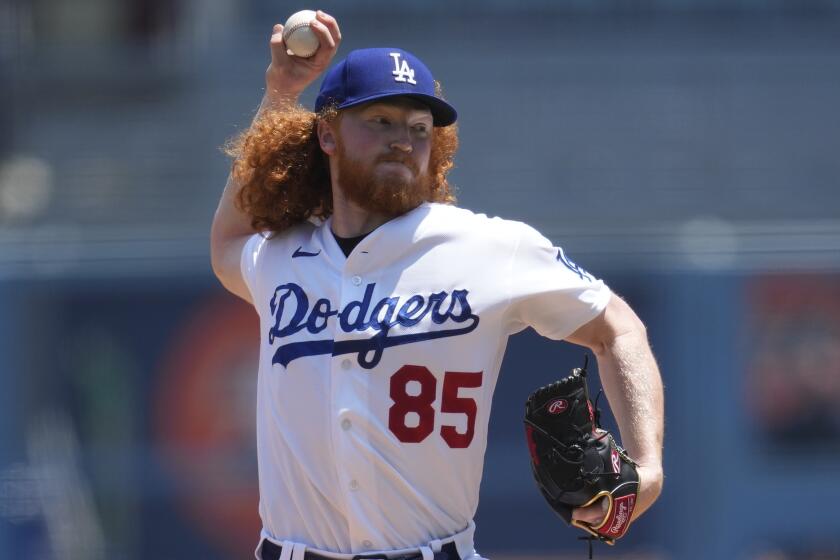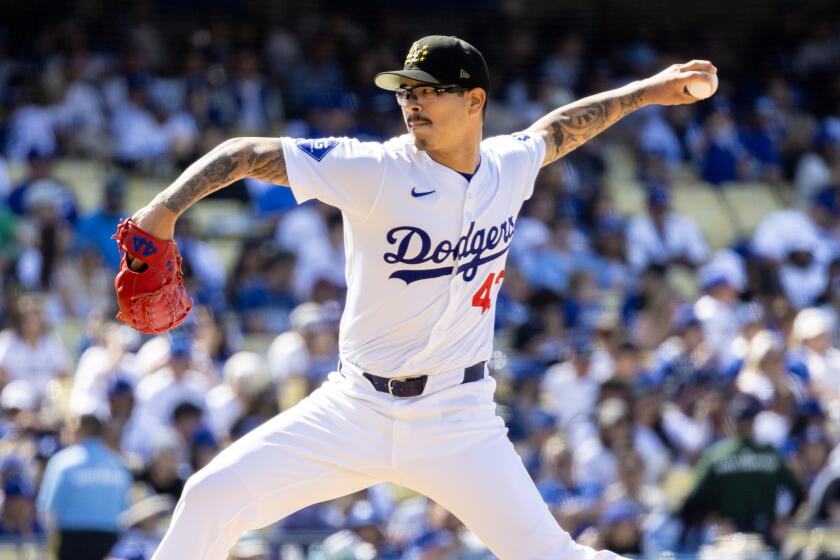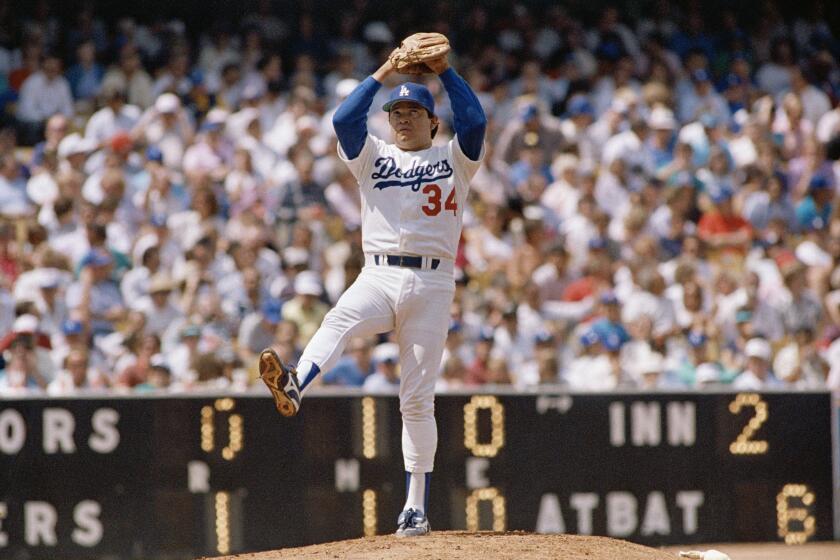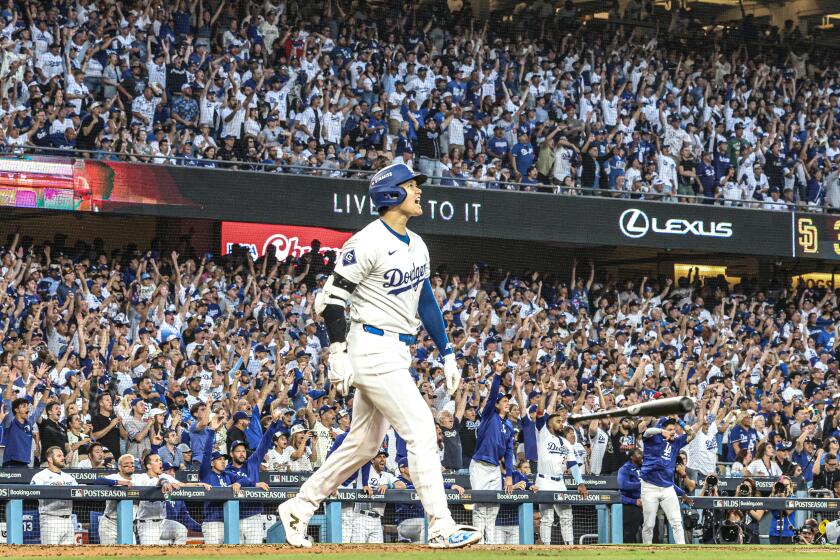Dodgers Win the West--Then the Game : Mellow Fans Take Victory for Granted : BY RICHARD HOFFER
News that another game in another city had been halted when fans threw bottles onto the field struck an incredulous chord at Dodger Stadium, where the home team was trying to clinch a division title. Threw bottles onto the field? To what purpose? Once, an usher recovered a beach ball here, but that was during the second game of a doubleheader, so there you are.
These are not normally passionate crowds. At least, they never appear so. They come to the game, applaud at the oddest moments (usually when broadcaster Vin Scully offers news of a rivalâs demise or when something interesting is on Diamond Vision) and leave early so as to be in traffic, to which they are so accustomed.
It was the same kind of crowd Wednesday night, although this one seemed small for a game of such consequence. There were 32,042 in the house. The Dodgers were about to win the National League West, pretty good for a team given so little chance in spring training. Yet entire sections of Dodger Stadium were empty. There was not one person in the right-field pavilion.
There were altogether few signs of expectation Wednesday night. It was hard to excite this crowd. Five mini-cams were ranged in front of the Dodger dugout before the game, suggesting something was up. The field reporters talked to whomever was available, going deep into the Dodger depth chart. Actor Chuck Connors stood in somebodyâs lights. He had played one game as a Dodger in 1949.
Other than that, letâs say the air was not electric with anticipation.
In the clubhouse before the game, some Dodgers crowded into a small room across from Manager Tom Lasordaâs office to watch the New York Mets-St. Louis Cardinals game, which would later be interrupted so the Mets could get out of the way of flying bottles. Should the Dodgers clinch, which they were sure to do eventually, they would play one of those teams. Yet, there was little rooting, one way or another. Fernando Valenzuela quietly signed a box of baseballs by the light of the TV. Bill Madlock ate popcorn.
In Lasordaâs office, watching the same game, there was a ribald commentary but not so ribald as to infer more than casual interest on his part.
Even when the game began and as it progressed, there was extraordinary decorum. There have been pennants clinched here before, you know. In the third inning, as the Dodgers were taking a 2-1 lead over the Atlanta Braves, some fans stood up in the right-field bleachers and tried to start The Wave. It collapsed within a section; the surf was not up.
There was some apparently spontaneous applause later; but you had to understand that Vin Scully had just announced the score from the Padres-Reds game, a score which projected the Reds bowing out of the race. In celebration a fan let a column of confetti drift down from the upper deck, flickering in the light of the lamps, and that was that.
Dodger Stadium could very well be the center of civilization. Or else this is just a tough crowd to please. Success is evidently regarded as a commonplace here; it is nothing to get riled up about.
The game went apace, with isolated cheers indicating Scully had updated the Padres-Reds score. A Diamond Vision feature, of some wonderful Dodger moments, was shown in the fourth inning, drawing the biggest applause of the evening. It was bigger than life, which is the explanation for that.
Then Mike Marshall hit a home run, and the score was 6-1 in favor of the Dodgers. The crowd put down their radios momentarily and stood up to cheer him and even brought him back out of the dugout. He doffed his cap and ducked back in, as if embarrassed.
This was more like it. The pennant race was briefly recalled.
In the next inning, as Mariano Duncan popped to first, there was suddenly an amazing and inexplicable cheer. For a pop-out? Yet, the stadium was suddenly alive. Oh, the Reds-Padres. Diamond Vision confirmed the news of Scullyâs in-house resonance at exactly 9:10 p.m. The Padres had eliminated the Reds, and the Dodgers had won their division.
For Dodger crowds, what happened next was pretty good. Everybody stood up. A man in the upper deck held a crutch aloft; he could walk again. And the team came out onto the field, and photographers snapped their hugging and high-fiving. The pitchers in the bullpen threw baseballs into the crowd. Pitcher Orel Hershiser, the baby-faced big-winner on this Dodger team, stood alone on first, watching his teammates celebrate. It was special to him. He had tears on his cheeks. âI should have studied better, so Iâd have more wordsâ he said afterward, explaining his inability to articulate his joy.
Hershiser tried to get into it all the same, so he threw his batting helmet up in the air and then forgot about it; he was that spontaneous. The helmet nearly bonked him on the way down.
The cheering continued, the fans on their feet, still. Ushers had mounted the tops of the dugouts to prevent anybody from storming the field, perhaps to carve some turf, to carry Hershiser away, or otherwise secure a memento of the occasion. However, there was no assault.
At exactly 9:13, the huge screen in left field went blank. The fans sat down. Atlantaâs Dave Shuler then made his pitch to Ken Landreaux, who hit into an inning-ending double play.
Some of the fans stood up and cheered more. In center field, a gate opened and a truck towed a sailboat onto the warning track and around the field. It would be a prize come fan appreciation night.
Many of the fans began to leave, so as to get into traffic. They had, after all, just seen the Dodgers win a division title.
More to Read
Are you a true-blue fan?
Get our Dodgers Dugout newsletter for insights, news and much more.
You may occasionally receive promotional content from the Los Angeles Times.










